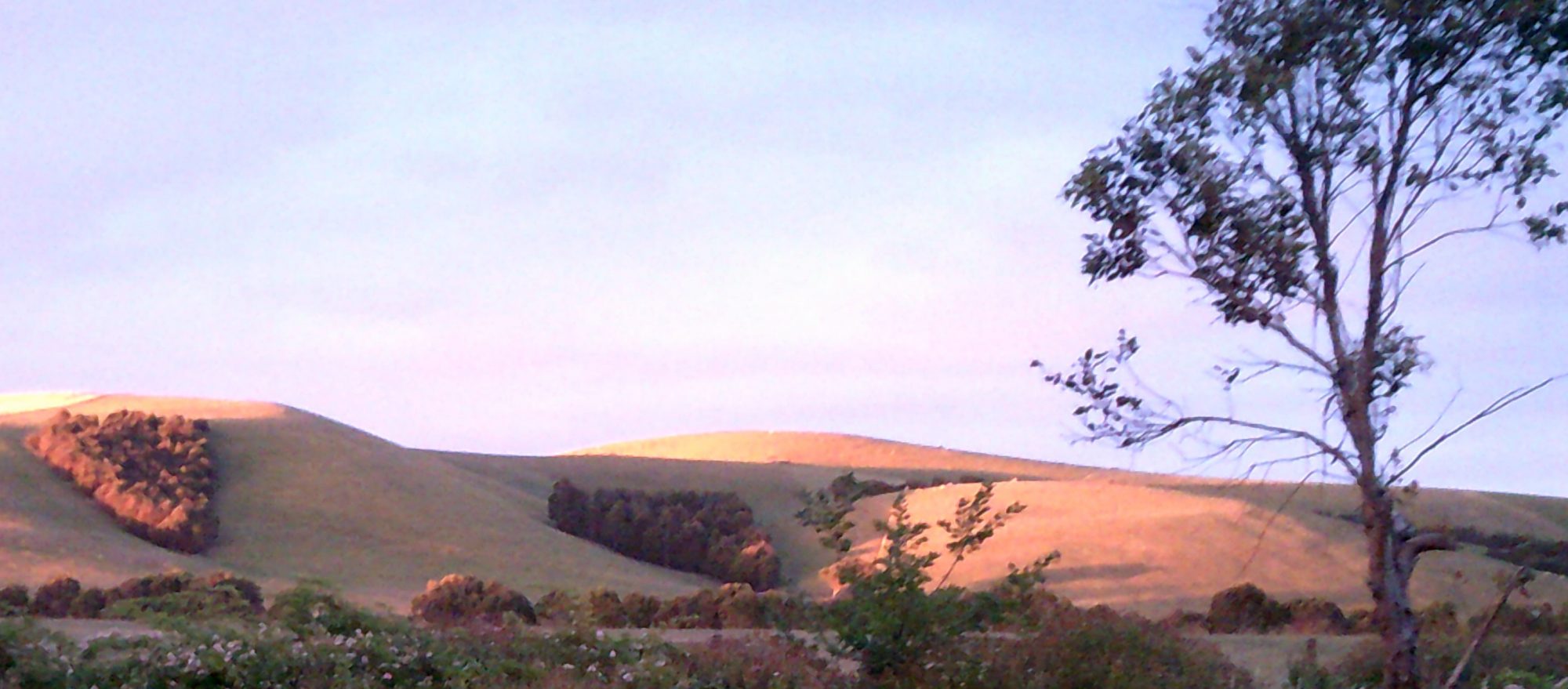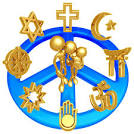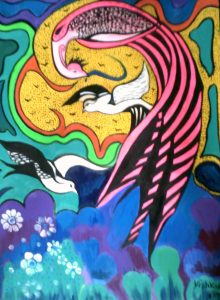Finally, I have finished my collection of twenty paintings on the Torah.
Thank you for your interest in my sacred art.
This collection of paintings is an attempt to trace my own Jewish identity through the wisdom of the Torah. The inspiration came at the end of 2018 when I gave up teaching to make Jewish scholarship my primary goal. Elements of my enquiry transported me back to my childhood in East London at a time when Jews were still being targeted with antisemitism. It reminded me of the pain of the Holocaust, which still lingered in many a household and it brought back the memory of my grandmother who sought and gained her strength through reading the Torah, turning to prayer and trusting in the Lord.
I have been an artist, writer, philosopher and psychotherapist, but scholarship occupies much of my time. I approach each aspect of my work from an interdisciplinary perspective. I trained as a painter in London with Kristin Berge, a pupil of Oscar Kokoschka and the Kokoschka School has had a great influence on my art, particularly in the use of colour. I also studied history and literature at London University before becoming employed in the production office of Sam Spiegel’s film company Horizon Pictures, where I gained patronage from the exiled Russian Baroness Maura Budberg. In the 1960s I transferred to South Africa and worked as an art director for the British company Gestetner. I exhibited my paintings in Johannesburg and taught at the local art school. I came to Australia in the 1970s and worked in my own company Wicca Productions as a graphic artist specialising in posters. Later I returned to university where I wrote my Masters theses in Psychoanalysis and Development and my Doctorate in Communications and Consciousness. I have since worked in art therapy and I have also produced a number of books on art, philosophy and mindfulness.
Currently, I live on a rural property, which I have refurbished as land for wildlife. I am an active environmentalist, an advocate of multifaith engagement and a worker for animal rights. I have been greatly blessed and my sacred art allows me to share my joys with others around me. I hope as you navigate this work you will gain the same pleasure from it as I have had in producing it. Shalom.
Here are the paintings.
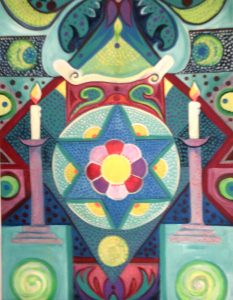
Shabbat Candles.
Bal Shem Tov taught that in the flame of the candle one sees three levels of light. The dark light corresponds to the love of Israel, which in turn represents the soul clothed in a material body, the white light corresponds to the love of Torah and the aura corresponds to the love of God.
Every Friday evening, we gather in the sanctuary to welcome Shabbat with the light of God, the singing of our prayers and our hearts opened and filled with love. We turn pain into comfort and sadness into hope. We praise God for His goodness and ask for His mercy. We emerge from the world of sorrow and transform it into blessings and joy. Thus, we are remembered, healed and strengthened for the week ahead.
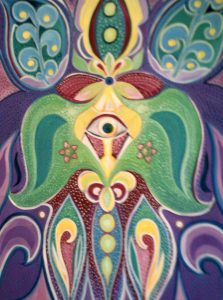
The Hamsa.
The Hamsa represents the Hand of God and it is sometimes known as the Hand of Miriam, a remarkable woman who is listed among the seven Jewish prophetesses. Miriam is a source of our strength. She was a guiding light when she waited by the bushes to watch over her little brother who had been placed in a basket floating among the reeds: And his sister stood from a distance to know what would happen to him (Exodus 2:4) “And she stood” – with Divine inspiration resting upon her. (Midrash – Mechilta d’Rabbi Yishmael).
We can all search for Divine inspiration. When we look to the sky, we see clouds. When we look beyond the clouds, we see the mystery that is the universe. When we look beyond the universe, we may not see the creator, but we can feel His presence in the miracle that is manifest in life and the everlasting consciousness of the soul. To know God is to know the life of love and happiness.
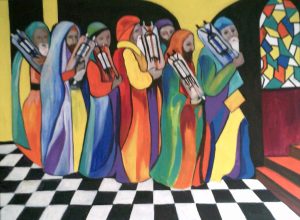
The Giving of the Torah.
Shavuot is a Jewish holiday which celebrates God’s giving of the Ten Commandments now contained in the Torah. Moses, ascended to the top of the mountain to meet with God, who gave him the Commandments, a moral code which was inscribed onto two stone tablets. The Torah has given us our moral code for a happy and fulfilling life. Further, the Torah binds us and gives us strength to face the perils of an uncertain world. …and you will return to the Lord, your God, with all your heart and with all your soul, and you will listen to His voice according to all that I am commanding you this day, you and your children. (Deuteronomy 30 x 2.)
We are never alone. When times are difficult, we can always turn to our maker for comfort and for those who say God does not listen to prayers, we are given the intellect to listen to our own voice and to be actors on our own behalf. God is everywhere. God is manifest in the silence of every deliberation.
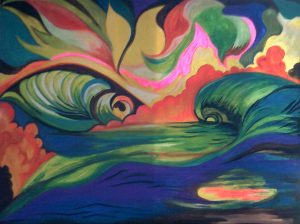
Genesis.
In the teachings of Ba’al Shem Tov every letter of the Hebrew alphabet exists in three dimensions; worlds, souls and divinity, otherwise the world as we know it, the spiritual as we experience it and God who oversees everything and every new beginning. How does the artist capture the essence of every beginning? We awake in the morning with a song and a prayer. Your word is a lamp to my feet and a light for my path. (Psalms 119:105). The artist makes art to be at the centre of religious thinking and believing. In every stroke of the brush there is breath, and in every breath, there is life, and in every life, there is God the creator and none can truly deny Him, else the stars are an illusion, the sun fails to rise and the moon has fallen from the sky.
Eden.
The Garden of Eden is also called Paradise. It is the Garden of God described in the Book of Genesis and the Book of Ezekiel. A man was placed in the garden and he was free to eat from any tree in the garden except from the tree of the knowledge of good and evil, but the man and a woman were seduced by the serpent and they ate the fruit from the tree of knowledge. How we humans have eaten from the forbidden fruits! How we continue to do so in mindless destruction! We have killed the tree of life and we have eroded the Earth that sustains us. Our planet was given in love and we have treated it with greed and contempt. Now we must seek redemption if we are to maintain human existence. In love, there is always redemption.
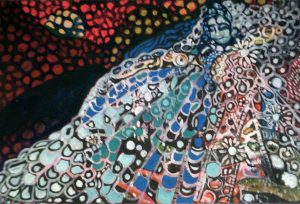
The Birth of Adam.
In his commentary on the story of Adam and Eve Rabbi Avraham Ibn Ezra states that Adam is the secret of the brain and Eve is the secret of the heart. Adam and Eve are the prototype forces of giving and receiving.
We are given bountiful gifts for which we must display ongoing gratitude and praise to our God. To give to another stimulates the mirror neurons in the human brain from which we derive the chemistry of happiness. To give and to receive are the rules of our co-existence, our sustenance and our satisfaction. Giving lengthens our life on Earth and assures our entry into God’s Paradise. To give with love and to receive with gratitude are the fabric of peaceful communities. When one cannot give, the acquiescence of life is lost. Life comes from life; love comes from love. Be at one with the universe, be at home with our God, be happy in giving and creating.
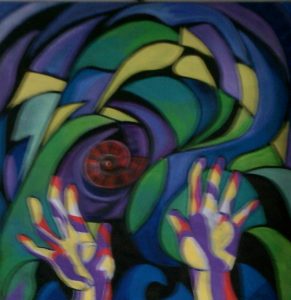
The Flood.
“And the Rain was upon the earth for forty days and forty nights” (Genesis 7-12). The function of water as a means of renewal is manifest in the Mikvah. Likewise, when the purifying waters fall on the planet it allows for a cleansing and renewal of the Earth. As we bathe in the tears of angels, we cleanse the body and rejuvenate the mind so we must not pollute the waters, else everything becomes decadent and polluted.
We are born from the waters of the womb and we connect back to the womb with our emotions. When life is a burden, we can renew our birth in the Holy waters.
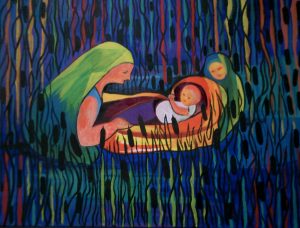
Moses and Miriam.
When Moses was born, happiness and light filled the house for three months. Then the Egyptian officials came to Amram’s house forcing the family to put Moses in a basket and leave him floating on the Nile. How God saves us! As a young girl Miriam put herself at risk by waiting at the reeds, watching to see how God would keep His promise. We are reminded of the necessary ingredients for redemption. Every day we must redeem our trust in God and move forward with courage and commitment. Every day we must consider those who are less fortunate. Every day we must offer a hand of friendship to those who feel displaced and who are floating in the abyss of unknowingness.
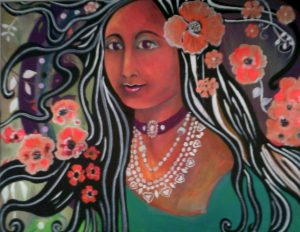
Zipporah.
Moses killed an Egyptian who was striking a Hebrew and was forced to flee for his life. When he arrived in Midian, Moses sat by a well watching as Reuel’s daughters came to water their father’s flocks. Other shepherds arrived and drove the girls away so they could water their own flocks first. Moses defended the girls, so their father gave Moses one of his daughters, Zipporah as his wife (Exodus 2:11-21). Why did Reuel give away his daughter? Is it not better to marry a good man who cares for a woman than to marry through impulse and infatuation? Zipporah teaches us that life is a series of lessons learned over time. She teaches us that love which grows like a small sapling becomes a strong tree. She teaches us that wisdom does not come overnight, it must be acquired through struggle, pain and experience. Without the difficult times we would never know the good. Torah guides us, but in the end, we are responsible for our own thoughts and actions. Think love.
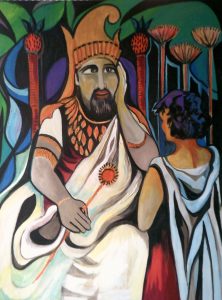
Joseph and the Pharaoh.
In the Torah, Joseph is sold into slavery by his jealous brothers, but he made good and rose to become the second most powerful man in Egypt next to the Pharaoh (Genesis 37-50). What do we learn from Joseph? Joseph’s life was filled with untold suffering, but he stayed faithful to God’s Commandments and eventually found favour with his master, but this did not protect him. Joseph had to learn that doing the right thing did not always have the best outcome and only God can be the true judge of what is appropriate.
Joseph teaches us forgiveness, not just the need to forgive others, but also to forgive ourselves. Forgiveness eases the pain of being hurt. Forgiveness removes animosity and it channels the more acquiescent areas of the brain so our minds can think clearly and productively. God forgives us our sins and here is the lesson for us to forgive others.
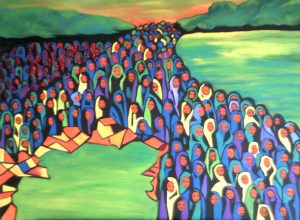
Exodus.
The freedom of the soul is the daily experience of the exodus from Egypt. “Hear of Israel, the God is our God, the God is one” (Deuteronomy 6:4). To hear is to understand and to transcend the confines of one’s own thoughts in the service of the Divine. In doing so we are not the captives of our desires. We have laws to guide us, but the sincerity in carrying them out must come from our hearts. We must know goodness and differentiate it from our habitual thoughts and longings. Goodness has its own unique dynamics and when we know goodness as a spontaneous trait, we fulfil our true aspirations. A life built upon personal gain and competitiveness only is not a wholistic and satisfying life. Pray for goodness, pray for strength and endurance. Our God hears us.
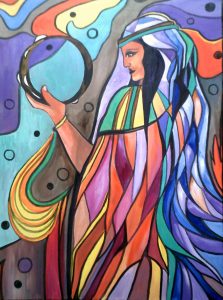
Miriam the Prophetess.
The Torah refers to Miriam as the Prophetess. She is viewed alongside Moses and Aaron when delivering the Jews from exile in Egypt: “For I brought you up out of the land of Egypt and redeemed you from the house of slavery, and I sent before you Moses, Aaron, and Miriam”(Exodus 15-20). Miriam is the music maker, the dancer and the creative force within all of us. She sustains our need for attention and love through pleasure and creativity. In creativity life blossoms. Creativity provides us with mindfulness. It slows down the thinking processes, settles the mind, eases the breathing and takes pressure of the body’s vital organs. Miriam teaches us to lighten the burdens in our life and to take everything as it comes with careful thought, love and responsibility.
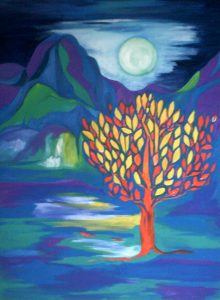
The Burning Bush.
God told Moses, “Take off your sandals, for the place where you are standing is holy ground.” (Exodus 3-5). Moses humbled himself before God. The flames of the burning bush never consume the plant. This reminds us that the fire in our lives need not be disastrous. Fire is energy with good and bad uses. Fire keeps us warm on cold winter nights, it can also send a signal of danger. Fire reminds us not to be complacent. We should never take things for granted. Everything can change in a heartbeat. With trust in God change need not concern us. If we move forward with faith, life becomes a lot easier. “Those who know your name trust in you, for you, LORD, have never forsaken those who seek you.” “Be still, and know that I am God. I will be exalted among the nations, I will be exalted in the earth!” … Do not be afraid; do not be discouraged, for the LORD your God will be with you wherever you go.”(Psalm 19.10).
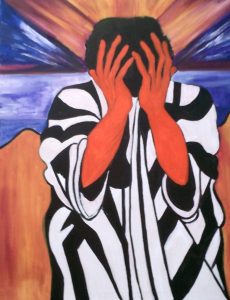
Prayer.
Prayer is the experience of the soul. Prayer is our private sanctuary, we must honour it, keep it safe and use it as often as we can. Prayer can help settle our mind and heal our pain and suffering. Prayer can happen in many forms and in many places, sometimes it is just a very private conversation with God who allows us to ask questions and to argue with him. In this way the dialogue is a process of building trust in God and in ourselves. The morning prayer lightens the day. “I thank you, living and enduring king, for You have graciously returned my soul within me. Great is your faithfulness”. Begin the day with a prayer and happiness will find you.
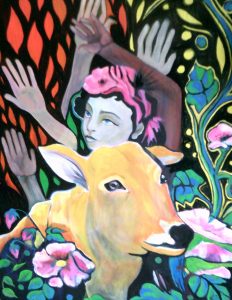
The Golden Calf.
The Golden Calf was an idol made by the Israelites when Moses went up to Mount Sinai. In Hebrew, the incident is known as ḥēṭ’ ha‘ēggel (חֵטְא הַעֵגֶּל) or the Sin of the Calf (Exodus 32:4). We are all prone to idolatry at times and it takes many forms. The Golden Calf reminds us to take a step back and evaluate what is on offer and what is of value. We must not lose sight of our trust in God. Fear can cause us to make bad decisions. Be sure that God watches over us. Moses burnt the golden calf in a fire, ground it to powder, scattered it on water, and forced the Israelites to drink it. When Moses asked him, Aaron admitted collecting the gold, and throwing it into the fire, and said it came out as a calf (Exodus 32:21-24). Transform in goodness because when we put our trust in God we can move forward with a clear mind and sound judgement.
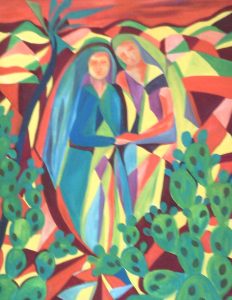
Rachael and Leah.
Rachel was Jacob’s first love and Leah was the first wife that Jacob actually married and the first to bear his children. Leah, the unloved wife, took consolation in also bearing Jacob’s children and she had deep feelings of sisterhood for Rachel. Leah prayed for Rachael to have a child who is female so that she too had her allotted share in the tribes of Israel. From this relationship we learn that giving has its own rewards. Jacob loved Rachel. And he said, “I will serve you seven years for your younger daughter Rachel.” 19 Laban said, “It is better that I give her to you than that I should give her to any other man; stay with me.” So Jacob served seven years for Rachel, and they seemed to him but a few days because of the love he had for her.(Genesis 20.19).
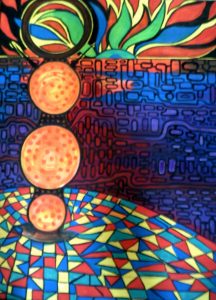
Temple Dreaming.
The City of Jerusalem has a long history during which it has been attacked 52 times, captured and recaptured 44 times, besieged 23 times, and destroyed twice. What can we learn from this? Perhaps we learn that the subject always wants what the other has. We must liberate from possessiveness before it takes control of our being. We must curtail the ensuring violence. My Jerusalem Dreaming represents the desire for peace, knowing that the road is littered with many obstacles. The Jerusalem Temple serves three faiths and it stands in the realms of possibility that one day an interfaith movement will conquer prejudice. Do you not know that you are God’s temple and that God’s Spirit dwells in you? (1 Corinthians 3:16 ).
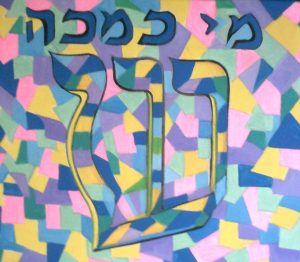
Who is Like You?
The Hebrew letter shin represents the Devine Revelation. The three heads point to the eternal flame. The three can also represent the two seeing eyes and the spiritual third eye, brought together in stillness and prayer. Who is like You O God among the gods that are worshipped? Who is like you, majestic in holiness, awesome in splendour, working wonders? Your children witnessed your sovereignty, the sea splitting before Moses and Miriam, “Tis our God”, they cried, “Adonai will reign for ever and ever!” (Exodus 15:11:2:18).
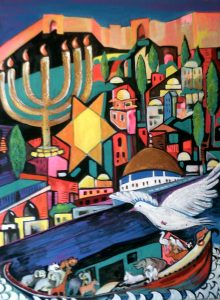
The Holy City.
We believe that God creates everything in the universe afresh in every single second. In the Uncertainty Principle, formulated by Werner Heisenberg in 1927 the position of a particle and its future location become less well known. Further, precise knowledge of a particle’s motion hinders knowledge of its present location. How then do we locate God when God is simultaneously in one place as well as being everywhere else? We locate God in our hearts and minds. We trust in his love and judgements. Everlasting love. You offered your people Israel by teaching us Torah and mitzvot, laws and precepts. Therefore, Adonai our God. When we lie down and when we rise up, we will meditate on Your laws and Your commandments. We will rejoice in your Torah for ever. (Mishkan T’filah,p32).
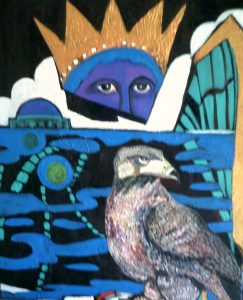
King David.
When King David ascended to the throne, he always kept his harp beside him. Every night at midnight, a slight breeze used to pluck at the strings and King David would wake from his sleep, rise from his couch and compose sweet, sacred songs in praise of God. The songs are called the Psalms of David. May
________________________________________________________________
1 Praise ye the Lord. Praise the Lord, O my soul.
2 While I live will I praise the Lord: I will sing praises unto my God while I have any being.
3 Put not your trust in princes, nor in the son of man, in whom there is no help.
4 His breath goeth forth, he returneth to his earth; in that very day his thoughts perish.
5 Happy is he that hath the God of Jacob for his help, whose hope is in the Lord his God:
6 Which made heaven, and earth, the sea, and all that therein is: which keepeth truth for ever:
7 Which executeth judgment for the oppressed: which giveth food to the hungry. The Lord looseth the prisoners:
8 The Lord openeth the eyes of the blind: the Lord raiseth them that are bowed down: the Lord loveth the righteous:
9 The Lord preserveth the strangers; he relieveth the fatherless and widow: but the way of the wicked he turneth upside down.
10 The Lord shall reign for ever, even thy God, O Zion, unto all generations. Praise ye the Lord. Psalm 146.
Shema
| Sh’ma Yisra’eil Adonai Eloheinu Adonai echad. Hear, Israel, the Lord is our God, the Lord is One. |
|
| Barukh sheim k’vod malkhuto l’olam va’ed. Blessed be the Name of His glorious kingdom for ever and ever. |
|
| V’ahav’ta eit Adonai Elohekha b’khol l’vav’kha uv’khol naf’sh’kha uv’khol m’odekha. And you shall love the Lord your God with all your heart and with all your soul and with all your might. |
|
| V’hayu had’varim ha’eileh asher anokhi m’tzav’kha hayom al l’vavekha. And these words that I command you today shall be in your heart. |
|
| V’shinan’tam l’vanekha v’dibar’ta bam And you shall teach them diligently to your children, and you shall speak of them |
|
| b’shiv’t’kha b’veitekha uv’lekh’t’kha vaderekh uv’shakh’b’kha uv’kumekha when you sit at home, and when you walk along the way, and when you lie down and when you rise up. |
|
| Uk’shar’tam l’ot al yadekha v’hayu l’totafot bein einekha. And you shall bind them as a sign on your hand, and they shall be for frontlets between your eyes. |
|
| Ukh’tav’tam al m’zuzot beitekha uvish’arekha. And you shall write them on the doorposts of your house and on your gates.
|
|
